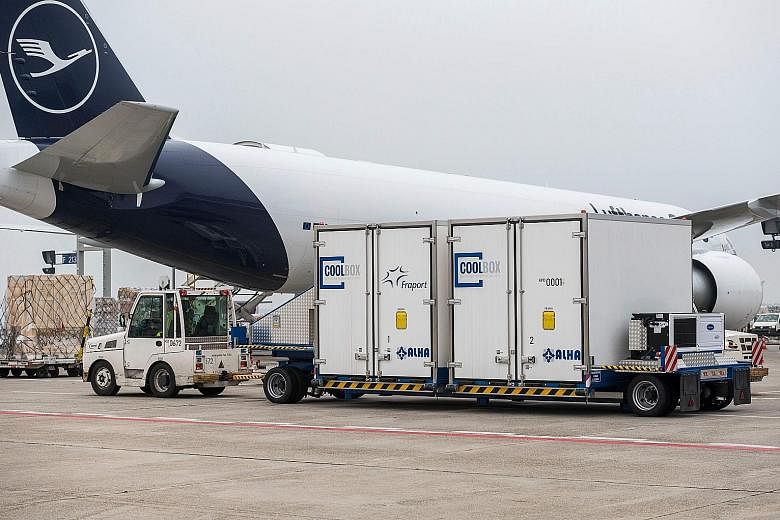FRANKFURT • In cooled warehouses on the fringes of Frankfurt airport, Deutsche Lufthansa is preparing its depleted fleet for the gargantuan task of airlifting millions of doses of the vaccines meant to end the coronavirus pandemic.
Lufthansa, one of the world's biggest cargo carriers, began planning in April in anticipation of the shots that drugmakers from Pfizer to Moderna and AstraZeneca are developing in record time.
A 20-member task force is devising ways to fit more of the crucial payload onto the airline's 15 Boeing 777 and MD-11 freighters, along with hold space in a passenger fleet now flying at just 25 per cent of capacity. "The question is how we scale it up," said Mr Thorsten Braun, who leads Lufthansa's part in the global effort.
Laid low by a Covid-19 outbreak that has decimated passenger demand, airlines will be the workhorses of the attempt to eradicate it, hauling billions of vials to every corner of the globe.
"This will be the largest and most complex logistical exercise ever," said Mr Alexandre de Juniac, CEO of the International Air Transport Association (Iata). It estimates that the equivalent of 8,000 loads in a 110-tonne capacity Boeing 747 freighter will be needed for the airlift, which will take two years to supply some 14 billion doses.
Here are some of the biggest challenges along the way:
CARGO CAPACITY
Airlines have drafted about 2,500 passenger planes into cargo-only roles, but distributing the vaccine would be easier if fleets were flying with usual frequencies to their usual destinations.
Pfizer plans to ship 1.3 billion doses of its vaccine by the end of next year. Moderna is producing about 500 million doses. AstraZeneca has manufacturing capacity for 2 billion doses.
To allow more passenger jets to be brought back into service, governments should open up travel, said Mr Glyn Hughes, Iata's global head of cargo.
DEEP FREEZE
The Pfizer-BioNTech vaccine adds an extra layer of difficulty. It must be transported at minus 70 deg C.
Upon arrival, the vaccine can be stored in ultra-low temperature freezers, or in a fridge in a hospital for five days at 2-to-8 deg C, or in a special Pfizer thermal shipper, in which the doses will arrive. That can be used as a temporary storage unit by refilling with dry ice for up to 15 days. Once thawed, the vials cannot be re-frozen.
The choreography will be extremely delicate, with controls in place from factory to clinic and all points in between.
STORAGE
Despite the hurdles, a well-established global network for pharmaceutical distribution should expedite the flow of doses. Cities ranging from Miami, Dallas and London, to Liege in Belgium, Dubai, Mumbai, Singapore and Incheon in Seoul have well-established deep-freeze capabilities.
Delivery firms have experience transporting flu vaccines and medical samples at low temperatures.
REACHING THE POOR
United Nations humanitarian relief agency Unicef has been recruiting airlines to distribute the vaccine to more than 170 countries.
The challenge is steep in emerging nations, where transport to remote areas may be rickety and unreliable, or even non-existent.
Singapore, a close neighbour to some of Asia's poorest nations, should be able to target a disproportionate share of the transit, according to Mr Alex Hungate, chief executive officer of ground-handling giant SATS.
THE LAST MILE
Delivery will involve more than airplanes. Cars, buses, trucks - even motorcycles, bicycles and donkeys - may be required to get the vaccine to rural areas. In some places, it may need to be carried in by foot. "You just don't have deep-freezers everywhere," said Mr Adar Poonawalla, chief executive officer of Serum Institute of India, the world's biggest vaccine maker.
The possibility of tampering, production of counterfeit shots and attempts to disrupt distribution are also a concern, according to Iata.
Mr de Juniac insists that the industry is ready. "We will not disappoint," he said.
BLOOMBERG
SEE OPINION

